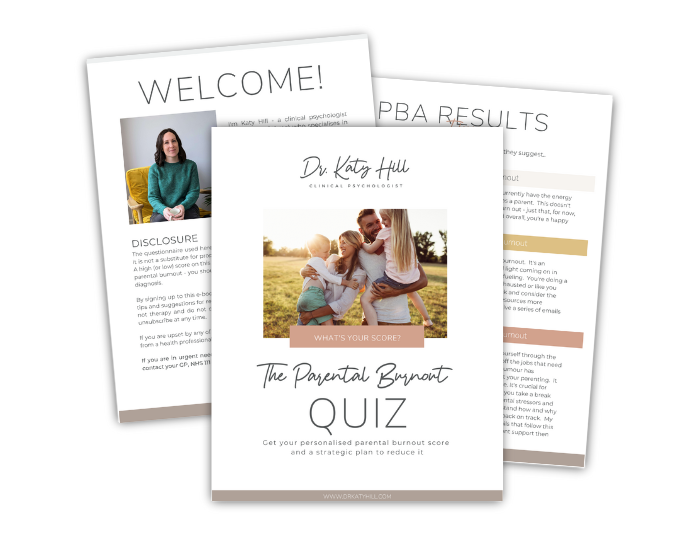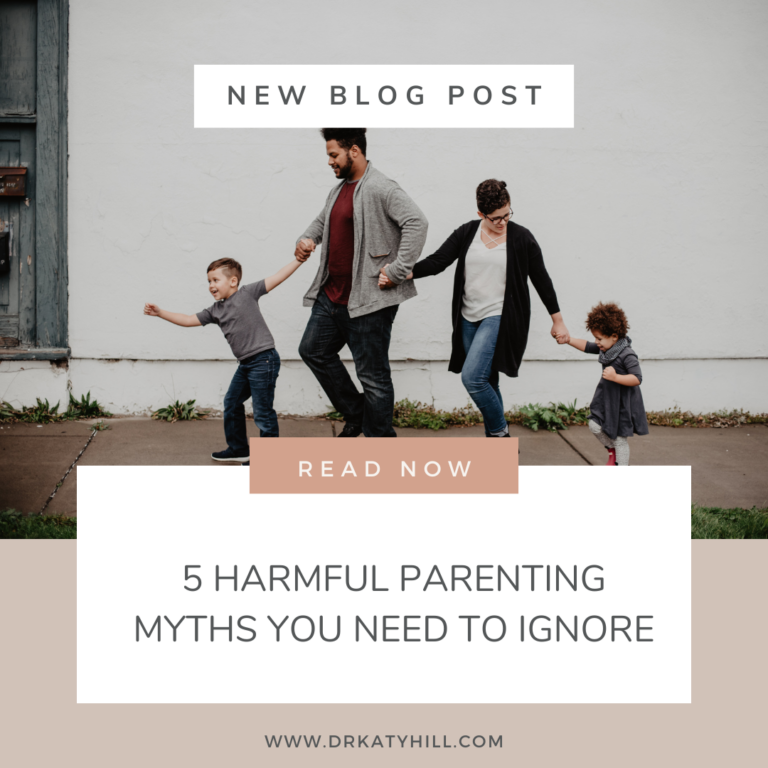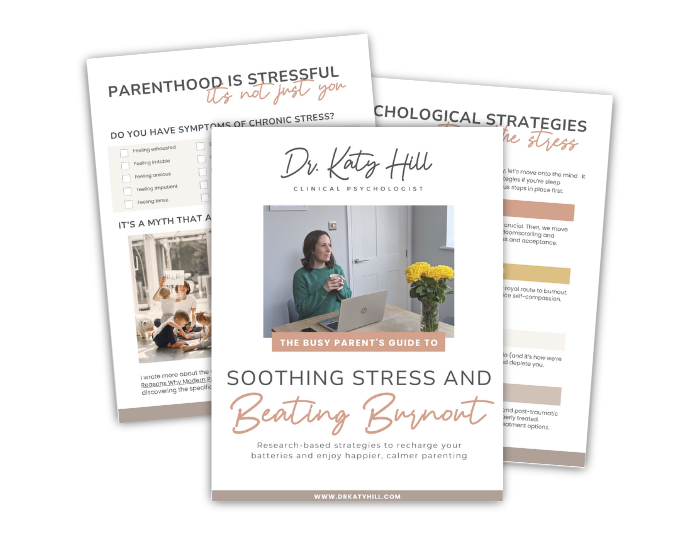Parenting has always been challenging (how could being responsible for the wellbeing of another person not be?) but there are some key reasons that it’s hard for modern parents (see my previous blog on the huge societal changes that have made parenthood more stressful).
One big reason is that we’re one of the first generations of parents to be bombarded with messages about what makes a ‘good parent’. Social media, parenting books and unsolicited advice abound, painting a picture of perfect parenting that’s impossible to achieve.
If you’ve ever had thoughts like “I shouldn’t keep losing my temper like this” or “Everyone else finds parenting so much easier than me” or “Why can’t I just enjoy this and be grateful?” then you’re absolutely not alone. These thoughts are fuelled by common myths about parenting that are setting us up to feel like we’re failing.
Let’s unpack five of the most harmful myths, explore why they’re untrue and talk about what you can do instead so you can parent with less pressure, more self-compassion and less guilt.
Myth #1: Good parents never get angry
The Myth: This is a big one – the idea that a good parent is always calm, patient and in control. If you get angry or frustrated, it must mean you’re failing. And if you listen to simplistic messages on social media, raising your voice will traumatise your child. This message is especially aimed at mothers as female anger has always been viewed as vulgar hysterics, whereas male anger is more often seen as assertiveness. It’s no wonder that the most common reason mums contact me for therapy is to reduce anger.
The Truth: Anger is a normal human emotion, not a moral failing. Anger is a signal – it arises when we feel threatened in some way, when our needs are thwarted, when there is injustice. Parents commonly try to suppress their anger but that just leads to bigger emotional outbursts later on. I also see parents who turn their anger inward, berating themselves for this human emotion, but this only raises the level of threat they feel and results in amplifying the anger.
What to Do Instead:
- Accept that anger is part of parenting and doesn’t make you a bad parent.
- When you’re feeling furious, get curious – turn towards the anger and get really curious about what it’s telling you, what’s it saying has to change? What needs are going unmet?
- Cultivate self-compassion – take care of those unmet needs, get more support, practice soothing your nervous system rather than ramping it up with self-criticism.
- When you lose your temper (as you will sometimes), focus on repairing and reconnecting (with your child and yourself); a simple statement like “That was a hard moment, I didn’t mean to react that way, but I love you and I’m working on being less reactive” can go a long way.
myth #2: PARentING SHOULD feel easy and natural
The Myth: Parenting should come naturally. If it feels hard it means that you’re not cut out for it. This is also a common fear of my clients – that they shouldn’t have become parents because they ‘don’t know what they’re doing’.
The Truth: Parenting is a skill, not an instinct. While we might have natural caregiving tendencies, parenting involves a complex mix of emotional regulation, problem-solving, and adaptability – all of which take practice. Anyone with more than one child will tell you how different siblings (even twins) can be and you learn to parent the child you have in front of you. Struggling doesn’t mean you’re failing; it means you’re learning.
And we don’t get much training – for most of human history, we parented in communities and adults would’ve had a lifetime of experience of babies and children before they had their own. For most of us now though, the first nappy we ever change usually belongs to our firstborn.
What to Do Instead:
- Practice patience and compassion for yourself; accept that you will make mistakes and they don’t mean you’ve failed – it means you’re learning.
- Let go of the expectation that parenting should feel effortless. Every skill takes time to develop.
- If parenting feels overwhelming, seek support or guidance – not because you’re failing, but because learning from others can make it easier and parenting was always meant to be a community activity.

The Parental Burnout Quiz
Curious what your own parental burnout score is? Download the free assessment and get your score – plus expert tips on how to reduce it.
myth #3: a good parent always puts their child first
The Myth: The best parents put their children before everything else. Taking time for yourself means you’re selfish or neglectful. This is another myth that disproportionately affects women – mothers are especially pressured to be selfless and are more easily judged as selfish than fathers if they pursue their own careers, hobbies or have nights away from their children.
The Truth: Parental burnout is real. Constant self-sacrifice doesn’t make you a better parent – it will make you an exhausted and resentful one. Research shows that when parents neglect their own wellbeing they’re more likely to struggle with patience, connection and emotional regulation. Self-care isn’t indulgent – it’s a necessity and will actually make you a better parent.
What to Do Instead:
- Reframe self-care: Instead of seeing it as selfish, recognise that a well-rested, emotionally regulated parent can be more present and engaged. Self-care IS child-care.
- Start small – self-care doesn’t have to mean a spa day. It’s little moments of quiet, deep breathing, having coffee with a friend, drinking more water, going to bed earlier – whatever you prefer to help soothe your nervous system so it’s not always on go, go, go.
- Take a family-centric rather than child-centric approach – make sure that everyone in the family gets their own time, their own moments of joy and connection with the things that matter to them.
myth #4: you should #enjoyeveryminute
The Myth: If you’re not loving every moment of parenting, you’re doing something wrong. It’s an extension of a wider societal myth that life should be happy at all times – something that advertisers seize upon to sell us stuff to attain this mythical state of permanent happiness.
The Truth: Parenting is a mix of joy, stress, exhaustion, and everything in between. Expecting to enjoy every second is unrealistic.
Social media amplifies this myth – all the highlight reels, the #blessed posts, the stern reminders that ‘you only have 18 summers; make them count! What you don’t see are the tantrums, messy kitchens, the illnesses, homework battles and sleepless nights that all parents face.
What to Do Instead:
- Accept that joy is one part of parenting but the whole range of human emotions will show up, and often in a stronger form than you were used to before you became a parent – and that’s ok.
- Practice mindfulness and self-compassion – notice how emotions rise and fall throughout your day, support rather than judge yourself when trickier ones arise.
- Share the trickier parts of parenting with those who you trust, you’ll soon learn that you’re not alone with the harder parts which can feel really validating and reassuring.
myth #5: good parents can manage on their own
The Myth: If you need help, it means you’re failing as a parent.
The Truth: This is another byproduct of our modern, individualistic culture – the idea that you should be able to achieve everything on your own but parenting was never meant to be a solo effort. Historically, parents relied on communities and extended families for support. The modern expectation that parents should handle everything without help is both unrealistic and harmful.
There is no shame in asking for guidance or support – whether from your partner, a friend or a professional. It’s a sign of strength, courage, self-compassion and ultimately, of how much you value your family’s wellbeing.
What to Do Instead:
- Recognise that can’t do everything on your own – parenting isn’t a solo sport.
- If you feel overwhelmed, reach out for support – even small things like talking to a friend or joining a parenting group can help.
- Consider therapy as a resource – not because you’re failing, but because having support can make parenting less stressful and more fulfilling.
you're not failing; you're measuring yourself against impossible standards
If you’ve been struggling with guilt or stress, it’s not because you’re failing as a parent – it’s because you’re measuring yourself against impossible standards and parenting myths.
Parenting doesn’t require perfection. It requires realistic expectations, flexibility, compassion for your child and for yourself.
If you’re feeling overwhelmed by guilt, stress, or burnout, therapy can help. I specialise in ACT and CFT-based therapy for parents, helping you let go of unrealistic expectations and parent in a way that aligns with your values.
If you’re ready to do things differently, click here to book a free 15 minute intro call and let’s chat about how we can work together to help you start feeling more confident, calm and connected in your parenting journey.








